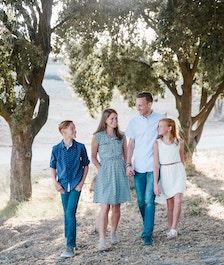A family mission statement: Why and how to make one
- THOMAS LICKONA
Creating a sense of purpose and identity.
 In my talks to parents, I always include how to make a Family Mission Statement. After the talk, I've had parents whose children are now grown, come up and say, "I wish we had done that as a family."
In my talks to parents, I always include how to make a Family Mission Statement. After the talk, I've had parents whose children are now grown, come up and say, "I wish we had done that as a family."
What is a family mission statement, and how can it help your family?
Successful schools, businesses, and non-profits typically have mission statements. Those mission statements identify their core values and create a common culture.
Culture shapes character. If we want to raise kids who are respectful, responsible, and kind, we need to create an intentional family culture that explicitly prioritizes and promotes those qualities.
A family mission statement is a way to do that.
- Sit down together as a family and ask, "What kind of a family do we want to be?"
- So that your kids feel ownership, ask them, "How should each of us behave and treat others if we want to have a happy family?" Give an example or two to get the process started.
- Then develop together a set of "We" statements that express what family members — adults and kids — will do their best to live by.
Below is one family's mission statement. Their kids were 9, 7, 6, and 4 when they made it.
The Davidson Way
We commit to being kind, honest, and fair.
We don't lie, cheat, steal, or hurt someone on purpose.
We don't whine, complain, or make excuses.
When we make a mistake, we admit it, make up for it, and learn from it.
We work to keep our minds, bodies, and souls healthy, strong, and pure.
We commit to growing in our faith through practice and trust in God's goodness.
We live with an attitude of gratitude.
Their Family Mission Statement hung in the kitchen where they could review it at the start of the week and refer to it when needed. The dad comments:
We occasionally read the entire thing, but mostly we look for the parts that pertain to a challenge we're responding to at the moment. We highlight that part and discuss it. The kids are beginning to remember and use some of the language.
We think the greatest benefit will be long-term. Having this in place now, before there are major issues, means we won't be starting with a blank slate when we face a problem later on.
If your Family Mission Statement becomes a continuing point of reference, it will create a shared sense of purpose and identity:
"This is how we live; this is who we are."
One family had an embroidered sign hanging in their home:
Remember you're a Morfit.
It was a simple reminder, aimed at keeping kids identified with the family values. You could use something like that in combination with your mission statement.
Of course, even with a Family Mission Statement in place, creating a culture of kindness and respect in your family will require lots of follow-through so that it doesn't become just "words on a wall." One way to follow through is to discuss every so often:
"How are we doing with our Mission Statement?"
"What's been better?"
"Where do we have room for improvement?"
With a family mission statement, you won't be starting from scratch every time you face a challenge. You'll have something to build on, something you created together. Something that makes you feel — even when you're having a tough week — that you're on the same team.
I urge you to do a Family Mission Statement with your family.

For more on the Family Mission Statement and related strategies, see Chapter 4, "How to Create a Positive Family Culture: 6 Principles," in How to Raise Kind Kids: And Get Respect, Gratitude, and a Happier Family in the Bargain.

 This is J. Fraser Field, Founder of CERC. I hope you appreciated this piece. We curate these articles especially for believers like you.
This is J. Fraser Field, Founder of CERC. I hope you appreciated this piece. We curate these articles especially for believers like you.
Please show your appreciation by making a $3 donation. CERC is entirely reader supported.

Acknowledgement
 Thomas Lickona. "A family mission statement: Why and how to make one." Psychology Today blog (September 2, 2019).
Thomas Lickona. "A family mission statement: Why and how to make one." Psychology Today blog (September 2, 2019).
Thomas Lickona writes a monthly blog, "Raising Kind Kids" for Psychology Today. This post is reprinted with permission from the author, Thomas Lickona, Ph.D.
Photo by Allen Taylor on Unsplash
The Author

 Thomas Lickona, Ph.D., is a psychologist and educator who has been called "the father of modern character education." A professor of education emeritus at State University of New York, Cortland, he is the founding director of the Center for the Fourth and Fifth Rs (Respect and Responsibility) and is the author of How to Raise Kind Kids: And Get Respect, Gratitude, and a Happier Family in the Bargain, Character Matters: How to Help Our Children Develop Good Judgment, Integrity, and Other Essential Virtues and Educating for Character. He has also written Raising Good Children and co-authored Sex, Love and You. Tom Lickona is on the Advisory Board of the Catholic Education Resource Center. Visit his web site here.
Thomas Lickona, Ph.D., is a psychologist and educator who has been called "the father of modern character education." A professor of education emeritus at State University of New York, Cortland, he is the founding director of the Center for the Fourth and Fifth Rs (Respect and Responsibility) and is the author of How to Raise Kind Kids: And Get Respect, Gratitude, and a Happier Family in the Bargain, Character Matters: How to Help Our Children Develop Good Judgment, Integrity, and Other Essential Virtues and Educating for Character. He has also written Raising Good Children and co-authored Sex, Love and You. Tom Lickona is on the Advisory Board of the Catholic Education Resource Center. Visit his web site here.


